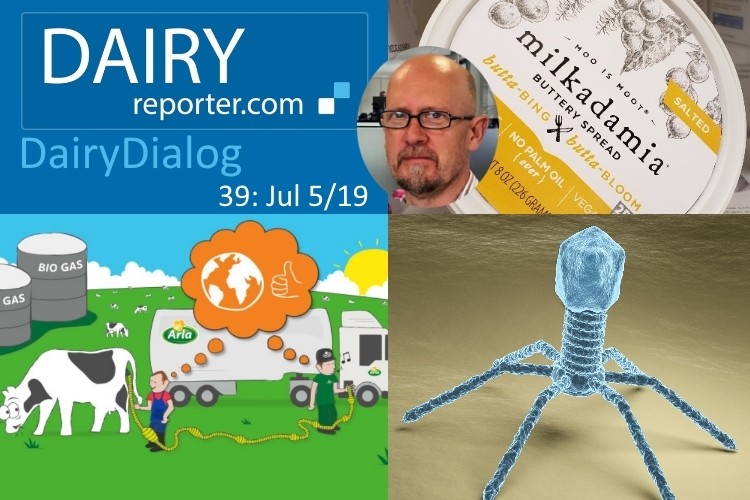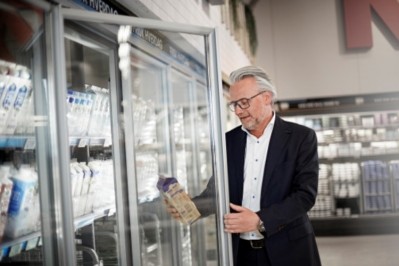Dairy Dialog podcast 39: Arla Foods, TOP SAFE and Milkadamia
This content item was originally published on www.dairyreporter.com, a William Reed online publication.

There’s also a connection to the second interview, as Arla is one of the companies involved in the TOP SAFE program looking at pathogen control. We spoke with Anne Elsser-Gravesen, co-owner of ISI Food Protection ApS, who is the TOP SAFE project leader.
And from last week’s Summer Fancy Food Show in New York, Beth Newhart speaks with Christina Downey, CMO of Milkadamia.
We also take a look at the global dairy markets with INTL FCStone’s Liam Fenton.
Arla Foods powering trucks with poop
Cow manure can do a lot more than create wrinkly noses. It is poised to be pivotal in a biogas revolution and contribute to a fossil-free fuel future. Pioneering Arla farmers are starting to make the most of their cow’s manure by turning it into biogas, which is now powering an Arla milk truck in Sweden.
The biogas can also be a source of the income for Arla’s farmer owners, and the biomass that remains after the cow manure is digested can be used as a fertilizer, which is more nutritious and odorless than the cow manure, creating a closed-loop system.
“The biogas initiative in Sweden demonstrates the potential of our farmer owners in Arla’s transition to becoming carbon net zero in 2050. We have a huge opportunity to develop the market for biogas as the cow manure from the Arla farmers in Sweden alone corresponds to 54 million liters of diesel,” Kristian Østerling Eriknauer, vice president of corporate responsibility in Arla, said.
Eighty-one farmers in Sweden are already delivering manure to biogas plants, running both milk trucks and city buses.
More trials on fossil-free fuels across markets
The biogas initiative in Sweden is one of several fossil-free fuel trials for transport running across the farmer-owned cooperative.
Over the next two years, as well as poop-powered vehicles, battery-powered electric trucks will be tested in Arla’s core markets.
“Technologies are developing fast and so is the political landscape, which is why we follow developments and test emerging technologies before investing in full-scale rollouts,” Østerling Eriknauer said.
Arla part of group looking at new approaches to pathogen control in fresh foods
A four-year collaboration between Danish business and research partners has produced breakthrough knowledge that promises consumers even better protection against food-borne pathogens.
Funded by Denmark’s Green Development and Demonstration Programme (GUDP), the TOP SAFE project has developed 200 opportunities to keep fresh foods safe by natural means.
TOP SAFE began in 2015 in response to the growing consumer demand for fresh foods, which have a naturally higher risk of contamination than other convenience products.
According to the European Food Safety Authority (EFSA), more than 320,000 cases of food-borne zoonotic diseases – caused by bacteria, viruses and parasites – are reported each year within the EU alone. The actual number is believed to be much higher, making these diseases a significant threat to public health.
Partners in the TOP SAFE project have used advanced biopreservation techniques to develop efficient, natural tools for protecting fresh vegetables, dairy products, poultry and red meat against Salmonella, E. coli, Campylobacter and Listeria.
Center of expertise for applied food microbiology, ISI Food Protection, has driven the project in collaboration with the University of Copenhagen, Arla Foods, Danish Crown, Flensted, Danpo and the Danish knowledge center for agriculture, SEGES.
“In addition to raising Denmark’s already high food safety standards to an even higher level, TOP SAFE has produced results that will reduce food waste significantly. Industrial trials at a meat production facility have also documented the efficacy of our biopreservation approach for the first time in full scale,” said Anne Elsser-Gravesen, co-owner of ISI Food Protection and TOP SAFE project leader.
The new tools take the form of bacteriophages, which are the ‘natural enemies’ of bacteria. Extensive research at the University of Copenhagen identified and tested 200 phages with the ability to attack and eradicate specific strains of pathogenic bacteria.
Lone Brøndsted, professor in phage biology and biocontrol, said, “Wherever you find many bacteria, you find many phages. We collect them from small lakes at Copenhagen Zoo, other parks and from wastewater, for example. Then we isolate them, characterise them and find out which specific bacteria they infect, their efficacy and how safe they are to use in food.”
Seminar
The TOP SAFE partners are now inviting food industry representatives to an open seminar on the current foodborne disease trends in the EU and the latest novel opportunities for producing safer foods. EU legislation regarding the use of phages in fresh foods will also be covered.
The free seminar, which has a limited number of spaces, will take place on September 25, 2019 in Agro Food Park, a leading hub for food innovation near Aarhus, Denmark.
To register, send your name and affiliation to rirag@ntebsbbqcnex.qx
Milkadamia at SFFS
The global specialty food market now generates about $150bn in annual sales, and many were on display last week at the Specialty Food Association’s Summer Fancy Food Show in New York City. The organization has 3,800 international members and puts on two trade shows every year.
Dairy alternative snacks and beverages are a major part of the market, which Milkadamia joined four years ago with the launch of its macadamia-based milk alternative. It then expanded to a line of creamers, and is now rolling out a butter alternative product.
Christina Downey, CMO of Milkadamia, told DairyReporter that macadamia nuts are an ideal base for vegan products and an untapped market in the US, because they are typically just coated in chocolate for snacking.
She said that the base the macadamia creates is creamy, buttery and mild, and less nut-forward than the average almond base. Milkadamia products are in 10,000 retail locations nationwide, and the lightly salted butter alternative will launch this fall.
“When Milkadamia declares ‘Moo is Moot’ on our packs we are voicing the opinion of the millions who have switched out dairy foods from their diets. Dairy milk is moot, irrelevant within and to the lives, aspirations, health and eco-desires of millions,” Milkadamia said.
Pic (of bacteriophage): ©Getty Images/extender01
























